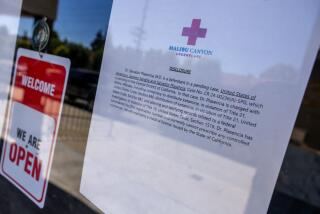Status Makes ‘Deviant Doctor’ Hard to Catch
- Share via
What happens when one of the most respected and trusted members of a community, a doctor, is a criminal?
Most often, said a panel of sociologists, the doctor gets away with it. A physician’s often exalted social status, combined with generally weak legal enforcement within the medical community, acts as an insulator against being found out and punished. Even when a doctor is brought before a court, his position may make a fair trial all but impossible.
The panel--composed of Henry Pontell, an associate professor of social ecology at UC Irvine; Steve Rosoff, a Ph.D. candidate in social ecology at UCI; Bonnie Berry, a post-doctoral sociology student at UCLA, and Paul Jesilow, an assistant professor of criminal justice from Indiana University--spoke at the Newport Marriott Hotel last Friday at the annual meeting of the Western Society of Criminology.
The nearly 600 members of the society are mostly academics specializing in sociology or criminology, but police, lawyers and professional criminologists also belong, said Susan Meier, the vice president of the organization.
Called Almost Sacrosanct
The panel discussing medical crime told an estimated three dozen listeners that the physician in America is an almost sacrosanct professional and the criminal--the “deviant doctor,” as he was called by the panel--often cheats patients, commits insurance fraud and malpractice and does it all with impunity.
Berry, who conducted a study of medical crime and punishment in Florida in 1983, said the most common medical crime is malpractice but, paradoxically, the punishment, if it is meted out at all, is seldom severe. Most of the malpractice cases she examined in her Florida study were dismissed, while there was vigorous punishment in cases involving less devastating crimes, such as insurance fraud.
Malpractice is difficult to detect, she said, and a doctor guilty of it might claim that any malpractice on his part could be explained by an error in judgment. Also, said Berry, guilt could be blunted by the claim that the patient would have died anyway.
To the board of medical examiners, the state body responsible for enforcement of professional medical standards, “an error in judgment may seem more excusable,” said Berry. Also, she said, most members of the Florida board were physicians themselves and may have been reluctant to hand down severe punishments for malpractice out of fear that they would be setting a precedent that could someday affect them.
Sees Statistical Pattern
The board, said Berry, likely was “aware of a shared risk.”
Berry called the relationship between the amount of medical crime in her Florida study and the number of sanctions--or, rather, the lack of them--by the state board of medical examiners “statistically significant.”
Jesilow said he found, through a nationwide study of Medicaid fraud he began with Pontell in 1982, that doctors also are seldom found out and punished for these swindles.
In interviewing dozens of federal and state officials and doctors, mostly in New York and California, Jesilow said he found that there was more fraud committed by doctors through Medicaid than Medicare because the criminal doctors believe, for several reasons, that they are less likely to be caught.
Because Medicaid provides funds for the treatment of indigent persons (rather than for the elderly, as Medicare does), the level of payment to doctors is lower, said Jesilow. Consequently, “physicians commonly believe that Medicaid recipients are slobs . . . and it’s much easier to violate a program they see as unworthy,” said Jesilow.
Enforcement is spotty also, he said, because medical lobbies consistently urge state and federal officials not to allocate money for it.
Jesilow said, based on convictions, that the physician most likely to commit health insurance fraud is the family or general practitioner, who is responsible for an estimated 27% of such fraud. Psychiatrists, he said, account for 18%, surgeons 11% and obstetricians and gynecologists 7%.
The easiest to catch is the psychiatrist, “because they bill for time, rather than services,” said Jesilow. But while it is relatively easy to determine if a psychiatrist is padding his time billing, “a physician may order tests for a person who can’t pay and still bear no financial responsibility,” said Jesilow. “And a lot of physicians over-utilize (tests) to avoid malpractice.
“We cannot actually know the amount of fraud that goes on. It’s a hidden crime,” Pontell said. “It’s a white-collar crime and people just don’t report white-collar crime.”
Status Can Backfire
However, said Rosoff, when a physician does face a jury in court, his status can backfire on him.
“It’s commonly assumed that high prestige protects an individual,” said Rosoff. However, “extreme deviance by a person of high status . . . changes (the prestige) from a shield to a target.”
Rosoff’s findings were based on a series of studies he performed in 1983 that involved nearly 800 criminal lawyers throughout the country. A total of two-thirds of those lawyers, said Rosoff, said they believed most jurors were prejudiced against a criminal defendant who was a physician.
And in a study at UCI involving hypothetical potential jurors trying a physician for first-degree murder (based on the Sam Shepherd murder trial of the 1950s), Rosoff found that the jurors were 10 times more likely to convict a doctor than a defendant who was not a doctor.
Between the two hypothetical defendants--”Dr. Williams” and “Mr. Williams,” a scientist, the jurors, said Rosoff, were less inclined to believe Dr. Williams, more likely to find him guilty and more likely to regret their decision if they found him innocent.
Problem of Shattered Faith
People expect a high standard of conduct from doctors, said Rosoff, and when a doctor commits a crime, the antipathy toward him is magnified by shattered faith.
Rosoff, who has studied the case of Dr. Jeffrey MacDonald, the Huntington Beach physician who was convicted in 1979 of killing his two daughters and his pregnant wife, said MacDonald once complained to him of being branded as a “wealthy playboy doctor.”
And, said Rosoff, the attitude of the public toward the criminal doctor was summed up by MacDonald’s lawyer, Bernard Segal, who Rosoff quoted as saying, “The physician may be, in fact, the most unlikable defendant of all.”
More to Read
Sign up for Essential California
The most important California stories and recommendations in your inbox every morning.
You may occasionally receive promotional content from the Los Angeles Times.













